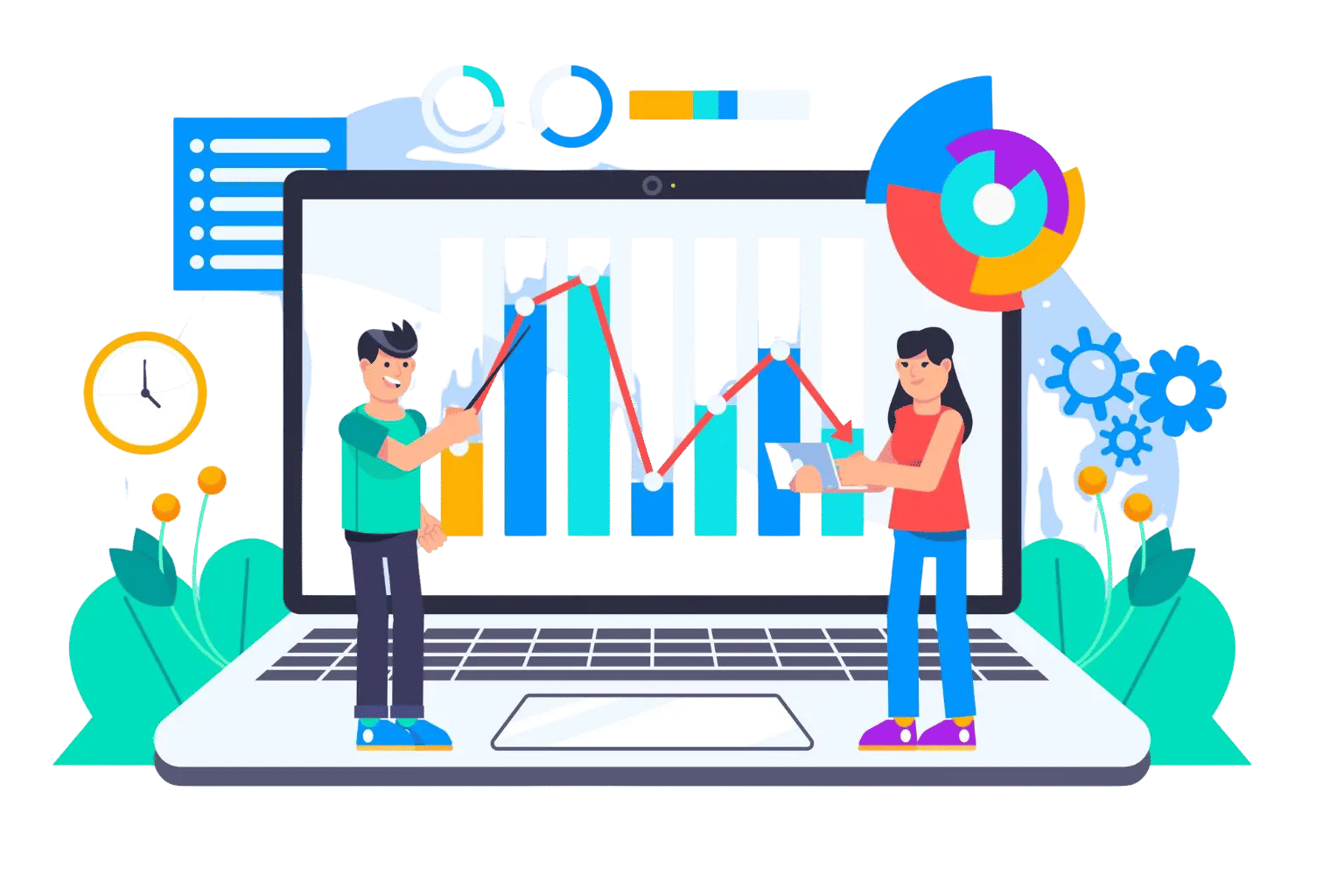
10 Best Performance Management Software for Small Business in 2025
In today’s competitive market, small businesses need tools that drive team efficiency and productivity. Performance Management Software for Small Business is one such tool. It helps streamline tasks like goal setting, feedback, and progress tracking, leading to measurable improvements in employee performance and overall company growth.
Performance Management Software for small business is essential to improving productivity and fostering employee engagement. It helps streamline tasks like goal setting, feedback, and performance tracking, leading to measurable improvements in employee output and business growth. With tools like Performance Management 365 and BambooHR, small businesses can align their teams with company goals, boosting motivation and enhancing overall performance.
Choosing the right software can be overwhelming with so many options. It’s important to consider factors such as ease of use, scalability, and integration with existing tools. By evaluating your needs and starting with a free trial, small businesses can find a performance management solution that drives growth, enhances employee satisfaction, and supports long-term success.
Click here to listen on the go!
Studies show that organizations with engaged employees experience 21% higher profitability and 17% higher productivity, as noted by Gallup. This highlights how performance management software for small business aligns employees with company goals, driving success. Additionally, reports stats that companies with strong performance management systems are 36% more likely to see higher profitability.
By implementing the right software, small businesses can create a culture of continuous improvement, boosting employee engagement and retention, which ultimately fuels long-term growth.
What is Performance Management Software for Small Business?
Performance Management Software is a tool designed to help businesses track, manage, and improve employee performance. It is an essential part of human resources (HR) technology, especially for small businesses looking to streamline their operations. The software provides a systematic way of assessing employee performance, setting goals, giving feedback, and ensuring alignment with business objectives.
In simple terms, this software helps businesses stay organized by providing clear, measurable goals and performance metrics for each employee. It ensures that employees understand their responsibilities, can track their progress, and receive feedback regularly, which leads to increased motivation and productivity.
Why Performance Management Software for Small Business Matters
Performance management is much more than simply tracking employee performance it’s about fostering a thriving environment where employees feel valued, supported, and motivated to contribute to the organization’s success. For small businesses, effective performance management enhances productivity, promotes employee growth, and strengthens company culture. Here are some additional reasons why performance management software is crucial:
- Improves Employee Accountability: When employees know their performance is being consistently tracked, it holds them accountable. This transparency encourages a culture of responsibility and ownership over their work.
- Supports Remote Work Environments: With the rise of remote and hybrid work models, performance management software enables managers to track progress, communicate feedback, and maintain consistent engagement with employees, regardless of location.
- Facilitates Data-Driven Decision-Making: Performance management software provides concrete data that helps managers make informed decisions on promotions, raises, training needs, and even staffing adjustments.
- Enhances Employee Retention: Regular feedback and performance tracking create a sense of personal investment in employees. When employees see their growth recognized, it increases job satisfaction and loyalty, reducing turnover rates.
- Strengthens Employee-Manager Relationships: The software opens up continuous channels of communication between employees and managers. Frequent interactions and check-ins lead to stronger, more trusting relationships, where employees feel their voices are heard.
- Encourages Long-Term Career Growth: Beyond immediate performance, performance management software helps guide employees on their career paths, identifying the steps they need to take for growth within the organization.
- Boosts Organizational Agility: With real-time performance insights, companies can quickly adapt and make adjustments to their teams and strategies, improving the company’s ability to respond to change swiftly.
- Provides a Holistic View of Employee Performance: Instead of relying on one-time annual reviews, performance management software for small business offers a comprehensive, ongoing assessment of an employee’s progress, helping to create a more accurate and fair representation of their performance.
Key Features of Performance Management Software for Small Businesses
When selecting Performance Management Software for Small Business, it’s important to understand the core features that will truly benefit your organization. Below are some essential features that the best software options offer:
Goal Setting & Tracking
One of the most crucial aspects of any performance management tool is the ability to set and track goals. For small businesses, this helps align the workforce with organizational objectives. Features like SMART goal setting (Specific, Measurable, Achievable, Relevant, Time-bound) help employees stay focused.
- Employee Empowerment: Goal setting gives employees a sense of ownership over their work, boosting motivation.
- Alignment: Aligning personal and company goals improves collaboration and team cohesion.
Continuous Feedback
Feedback is essential for growth. The best Performance Management Software for Small Business allows managers to give regular, actionable feedback instead of waiting for annual reviews.
- Real-Time Feedback: This helps employees know where they stand and how to improve without waiting for formal reviews.
- Encouragement: Positive feedback drives morale and helps employees stay motivated.
Performance Appraisals
Performance reviews are essential in identifying strengths and areas for development. Performance Review Software simplify this process, enabling managers to evaluate employees on a regular basis.
- Structured Reviews: Structured performance appraisals ensure consistency and fairness.
- Actionable Insights: Employees can work on specific areas for growth based on the appraisal.
Employee Development
Tracking progress is only half the battle. The other half is using the insights gained to develop employees. Performance management software can guide small businesses in identifying skill gaps and providing relevant training.
- Training Programs: Employees can be assigned specific training to improve their skills.
- Career Growth: Employees see clear career development paths, which increases retention rates.
Analytics & Reporting
Analytics is a game-changer in performance management. Software that offers performance reports helps managers make informed decisions on promotions, raises, and even team restructuring.
- Data-Driven Decisions: Use data to make informed decisions rather than relying on subjective opinions.
- Improvement Tracking: Monitor performance over time and track improvements.
Why Small Businesses Need Performance Management Tools
Small businesses, with their limited resources and tight-knit teams, face unique challenges when it comes to managing employee performance effectively. While large corporations have dedicated departments for performance management, small businesses often juggle multiple roles, making it more difficult to maintain a structured system. This is where Performance Management Tools come in offering solutions tailored to meet the specific needs of small businesses. Here are key reasons why small businesses need performance management tools:
1. Streamlining Employee Performance Evaluation
Performance evaluations are crucial for assessing employee progress and identifying areas for growth. For small businesses, having a simple yet effective performance management tool streamlines this process. Instead of relying on manual tracking, which is time-consuming and prone to errors, these tools offer automated evaluation systems, allowing managers to focus on high-value activities.
- Simple Reporting: Performance management tools provide real-time reports that give managers an overview of employee performance, eliminating the need for spreadsheets and manual updates.
2. Facilitating Employee Development and Growth
Small businesses may not always have the budget to provide extensive training programs. However, performance management tools can still help identify skill gaps and areas for improvement, guiding targeted development initiatives. These tools help small business owners and managers create tailored development plans for employees, ensuring that their professional growth aligns with the business’s objectives.
- Training and Coaching: By tracking individual performance and offering continuous feedback, performance tools can direct employees toward specific development opportunities, fostering their career growth within the company.
3. Enhancing Communication and Feedback
In smaller teams, communication is vital. Performance management tools enhance the feedback loop by enabling managers and employees to share insights in real-time. With the ability to give both positive and constructive feedback instantly, these tools encourage a culture of continuous improvement.
- Transparent Communication: The tools enable regular check-ins, making feedback a two-way conversation that helps both employees and employers stay aligned on expectations and progress.
4. Improving Employee Motivation and Engagement
Employee engagement is directly linked to performance, and small businesses need to actively motivate their teams. Performance management tools help by setting clear goals, tracking achievements, and recognizing employees’ contributions. This leads to higher morale and productivity, as employees feel acknowledged and appreciated.
- Real-Time Recognition: Instant recognition and feedback empower employees to stay motivated and engaged, ensuring they feel valued in their roles.
5. Boosting Retention Rates
Hiring new talent is expensive and time-consuming for small businesses. Performance management tools help boost employee retention by identifying and addressing issues early. By fostering a culture of growth, recognition, and clear expectations, these tools improve job satisfaction and make employees more likely to stay with the company long term.
- Preventing Turnover: Regular performance assessments allow businesses to spot dissatisfaction or burnout early, allowing them to address it before employees consider leaving.
6. Ensuring Alignment with Business Goals
As small businesses grow, aligning employee goals with the company’s vision becomes more critical. Performance management tools ensure that all employees understand how their individual goals tie into broader organizational objectives, creating a cohesive and motivated workforce.
- Goal Alignment: Performance tools make it easier for managers to set both individual and team goals, ensuring everyone is working toward the same outcome, whether it’s boosting sales, improving customer service, or launching a new product.
7. Data-Driven Decision Making
Performance management tools collect and organize employee data that small business owners can use to make informed decisions. Whether it’s choosing which employee deserves a promotion, identifying who needs additional training, or determining which team is excelling, data-driven insights can guide crucial HR decisions.
- Analytics for Growth: These tools allow businesses to track employee performance trends over time, providing valuable insights that help shape strategic decisions and improvements.
8. Simplifying Compliance and Documentation
For small businesses that are trying to comply with labor laws and regulations, performance management software for small business simplify the documentation process. By tracking goals, feedback, and performance reviews, the software ensures that businesses maintain accurate records that can be easily accessed for compliance audits or legal requirements.
- Automated Documentation: Performance management software makes it easy to store and retrieve performance data, ensuring compliance with regulations and reducing administrative burdens.
The Top 10 Performance Management Software for Small Business
Choosing the right Performance Management Software for Small Business can be a daunting task with so many options available. With each software offering unique features, strengths, and pricing models, it’s important to evaluate which one best aligns with your business needs. In this guide, we will explore the top 10 tools for 2025, based on features, ease of use, and customer feedback. These performance management tools not only help businesses track employee performance but also foster an environment of growth and engagement. Here’s an overview of the best solutions available this year:
1. Performance Management 365
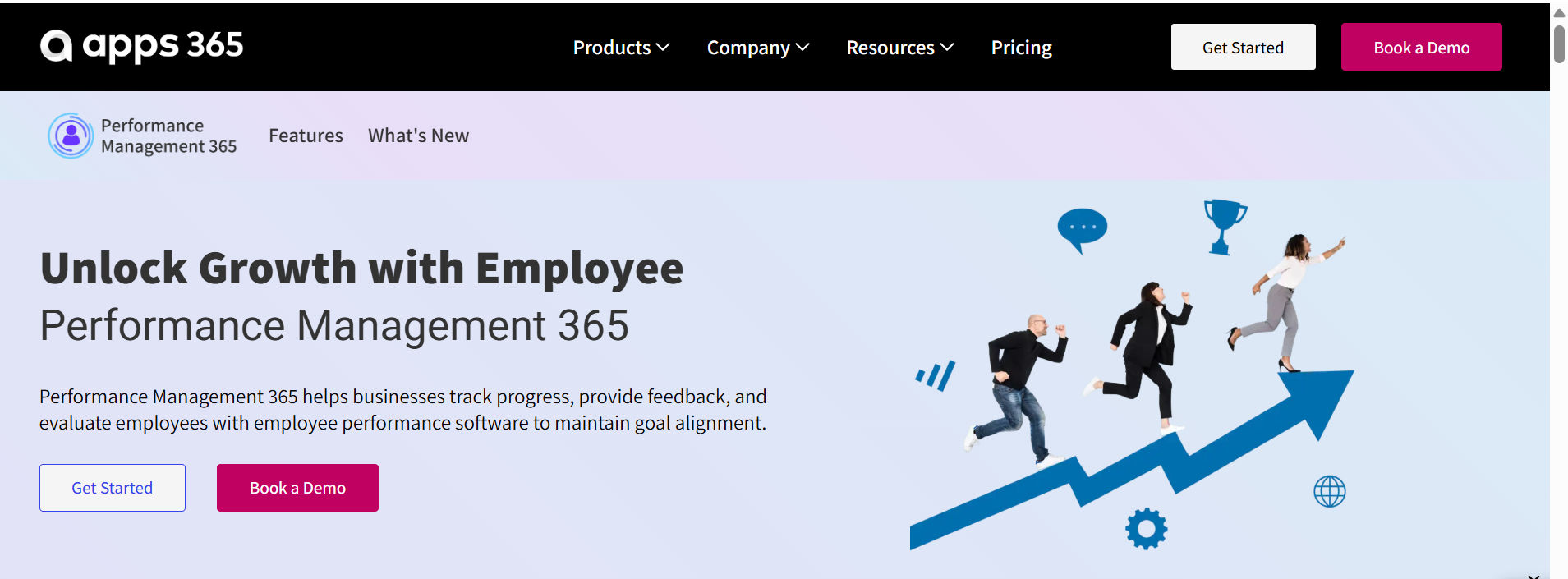
Performance Management 365 offers small businesses a seamless solution integrated with Microsoft 365 tools. With customizable performance tracking, goal-setting, and real-time feedback, it empowers businesses to improve team performance, identify development needs, and align employees with business goals.
- Strengths: Seamlessly integrates with existing Microsoft tools like Teams, Outlook, and SharePoint. It offers detailed analytics, continuous feedback, and goal-setting features.
- Best for: Small businesses that already use Microsoft 365 products and need a comprehensive solution that can integrate with their existing tools.
Additional Features:
- Real-time feedback and progress tracking
- Employee performance reviews based on KPIs
- Customizable goals and feedback mechanisms
- Mobile-friendly for easy access
2. BambooHR
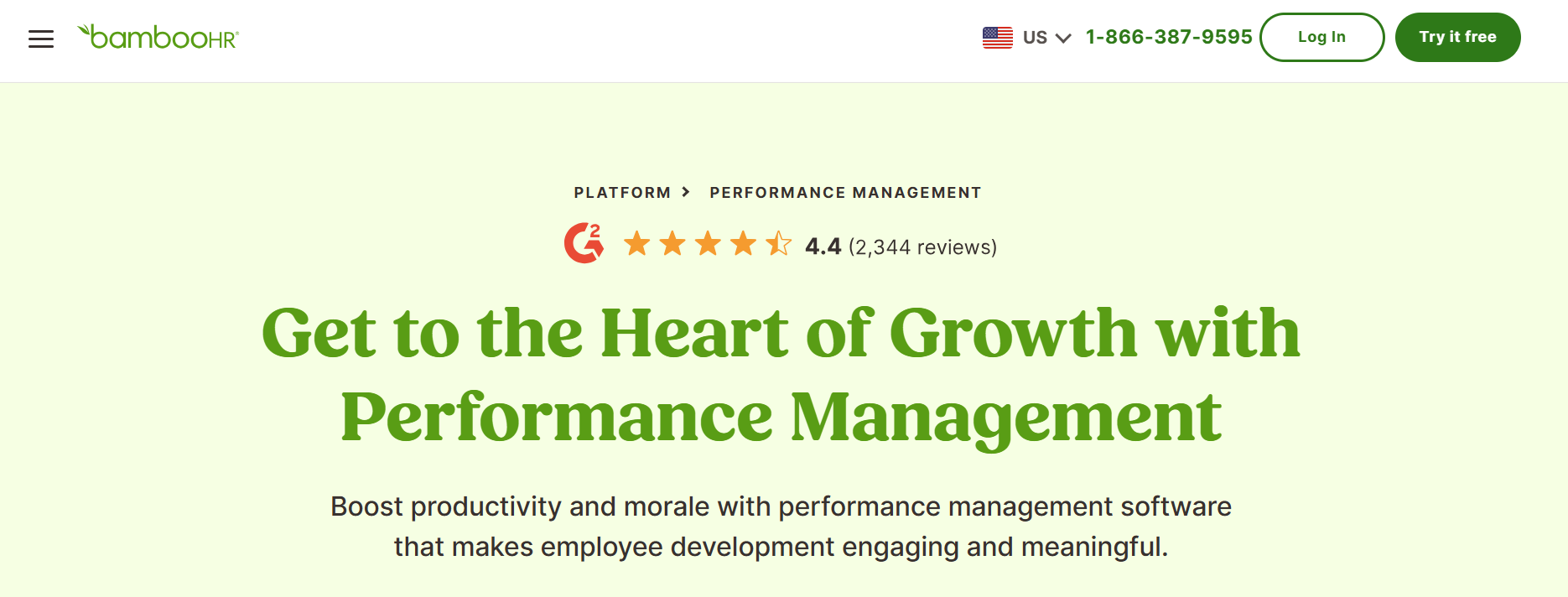
BambooHR is a user-friendly HR software designed for small to mid-sized businesses. It offers robust performance management tools that include performance tracking, goal-setting, and feedback. With its simple setup, small businesses can easily manage employee performance while staying within budget.
- Strengths: Easy-to-use interface, customizable performance reviews, employee self-assessments, and real-time feedback.
- Best for: Small businesses with small HR teams who need an intuitive, budget-friendly performance management tool.
Additional Features:
- Employee self-service portal
- Employee engagement surveys
- Time-off tracking and reporting
- Customizable reports and data export
3. Lattice

Lattice is a performance management platform that goes beyond tracking performance by fostering employee development through regular feedback, goal-setting, and 1-on-1 meetings. The platform helps businesses encourage growth and engagement while continuously aligning employee efforts with company goals.
- Strengths: Real-time feedback, goal-setting, customizable performance reviews, and a robust employee development focus.
- Best for: Companies seeking to invest in employee development and long-term growth through a continuous feedback loop.
Additional Features:
- 360-degree feedback surveys
- Career pathing and development tools
- Continuous engagement and coaching features
- Performance insights and analytics
4. 15Five
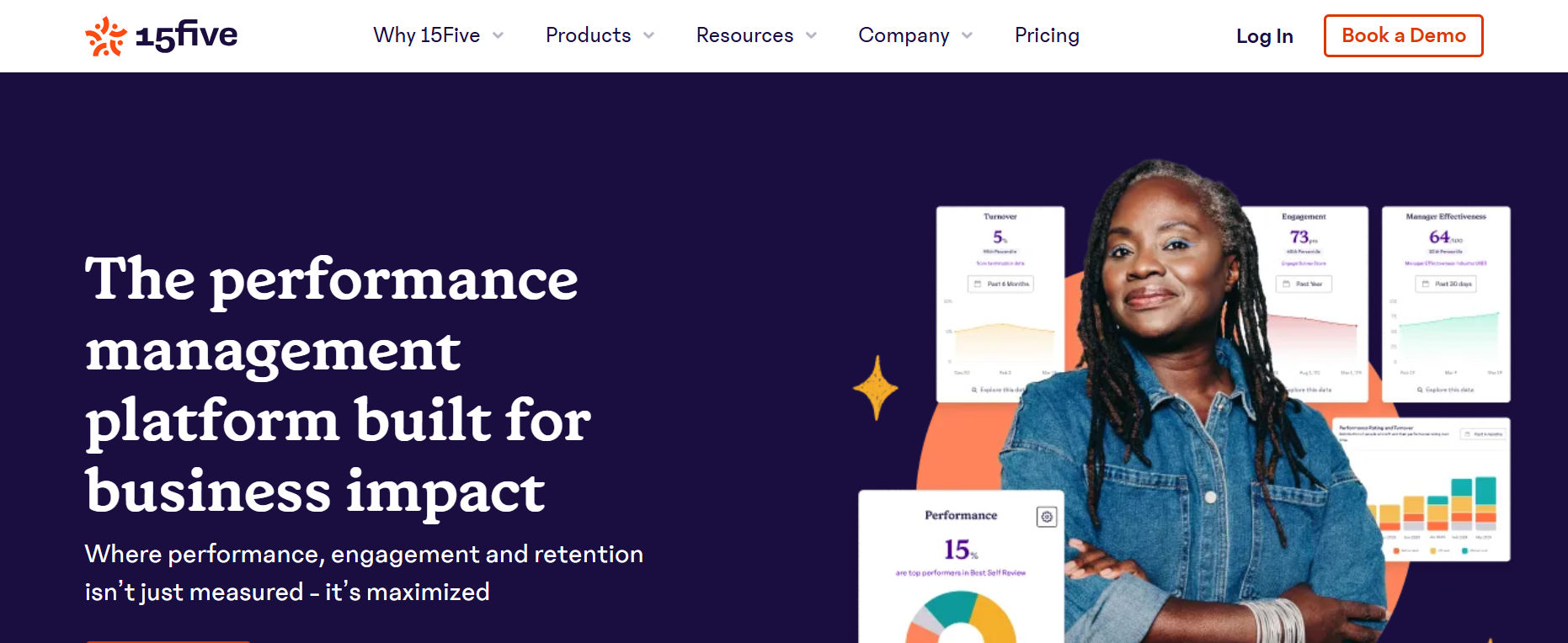
15Five emphasizes continuous performance management with a unique focus on employee engagement. It helps managers give weekly check-ins and ongoing feedback, making it a valuable tool for maintaining open communication between employees and managers.
- Strengths: Weekly check-ins, performance reviews, real-time feedback, employee recognition, and alignment features.
- Best for: Small businesses that prioritize transparent communication and regular check-ins between managers and employees.
Additional Features:
- Weekly check-in templates and customization
- Employee recognition tools
- Performance tracking with goals and KPIs
- Flexible reporting and performance summaries
5. Trakstar
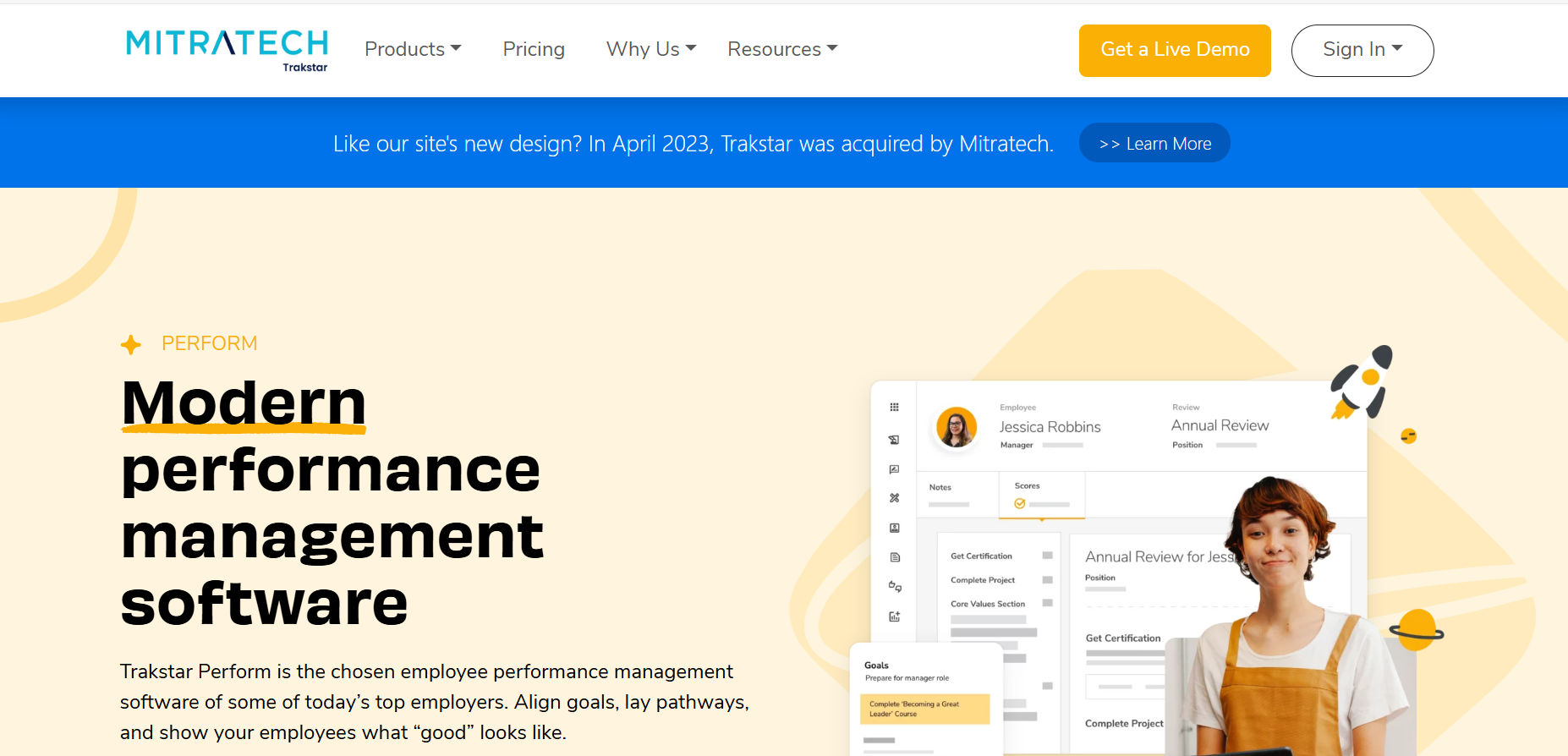
Trakstar offers a highly customizable and easy-to-use performance management solution. It’s perfect for small businesses that want an intuitive platform to conduct performance reviews, track employee goals, and give feedback on time. Trakstar helps streamline the performance management process while providing valuable insights.
- Strengths: Customizable performance reviews, goal tracking, simple interface, and feedback tools.
- Best for: Small businesses looking for a straightforward and cost-effective performance management solution.
Additional Features:
- 360-degree feedback
- Training and development tracking
- Employee appraisals with rating scales
- Visual reports and performance dashboards
6. Reflektive
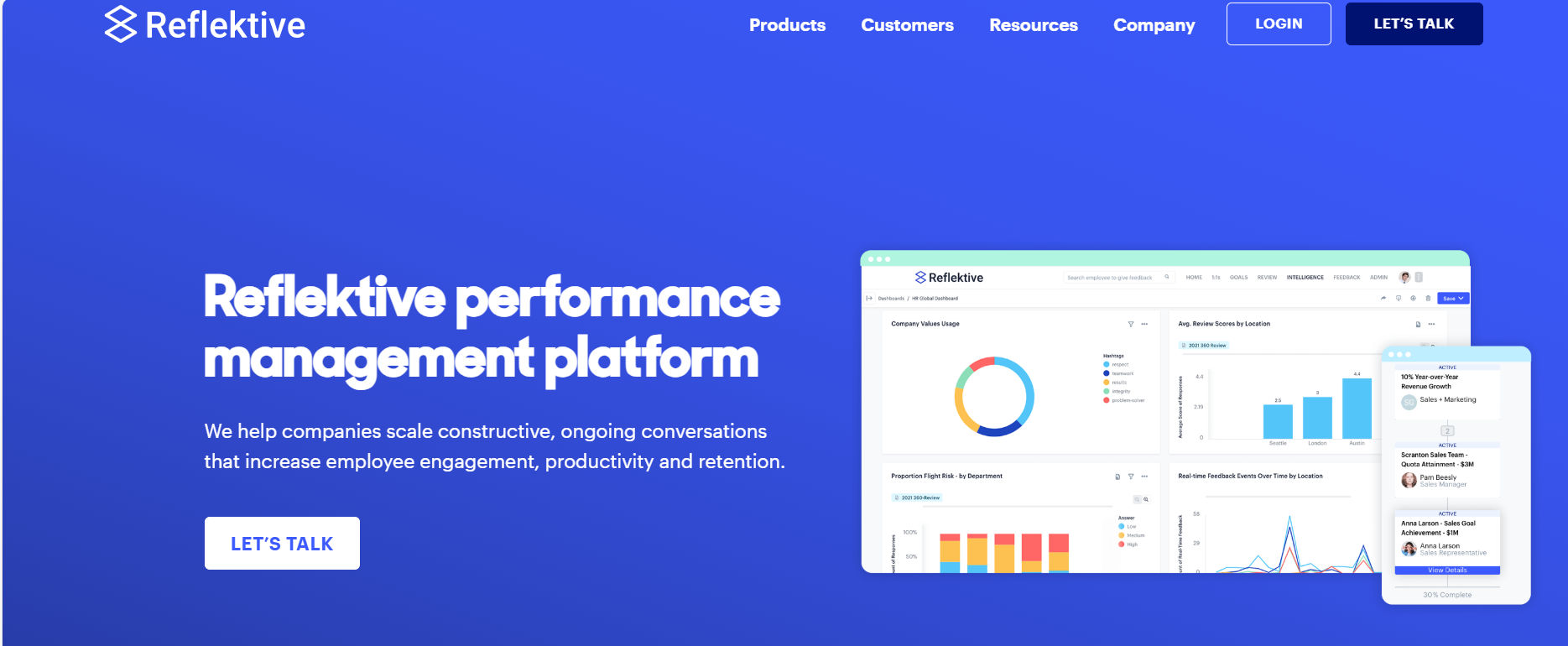
Reflektive offers an engaging performance management system with an emphasis on feedback and coaching. It empowers managers to provide real-time feedback, enabling a continuous learning process. Reflektive helps businesses build a performance-driven culture, leading to improved employee motivation and satisfaction.
- Strengths: Real-time performance tracking, continuous feedback, employee recognition, and performance rewards.
- Best for: Businesses that want to combine performance management with high employee engagement and recognition.
Additional Features:
- Goal setting and tracking
- Performance reviews and continuous feedback
- 360-degree employee feedback
- Recognition and rewards platform
7. Engagedly
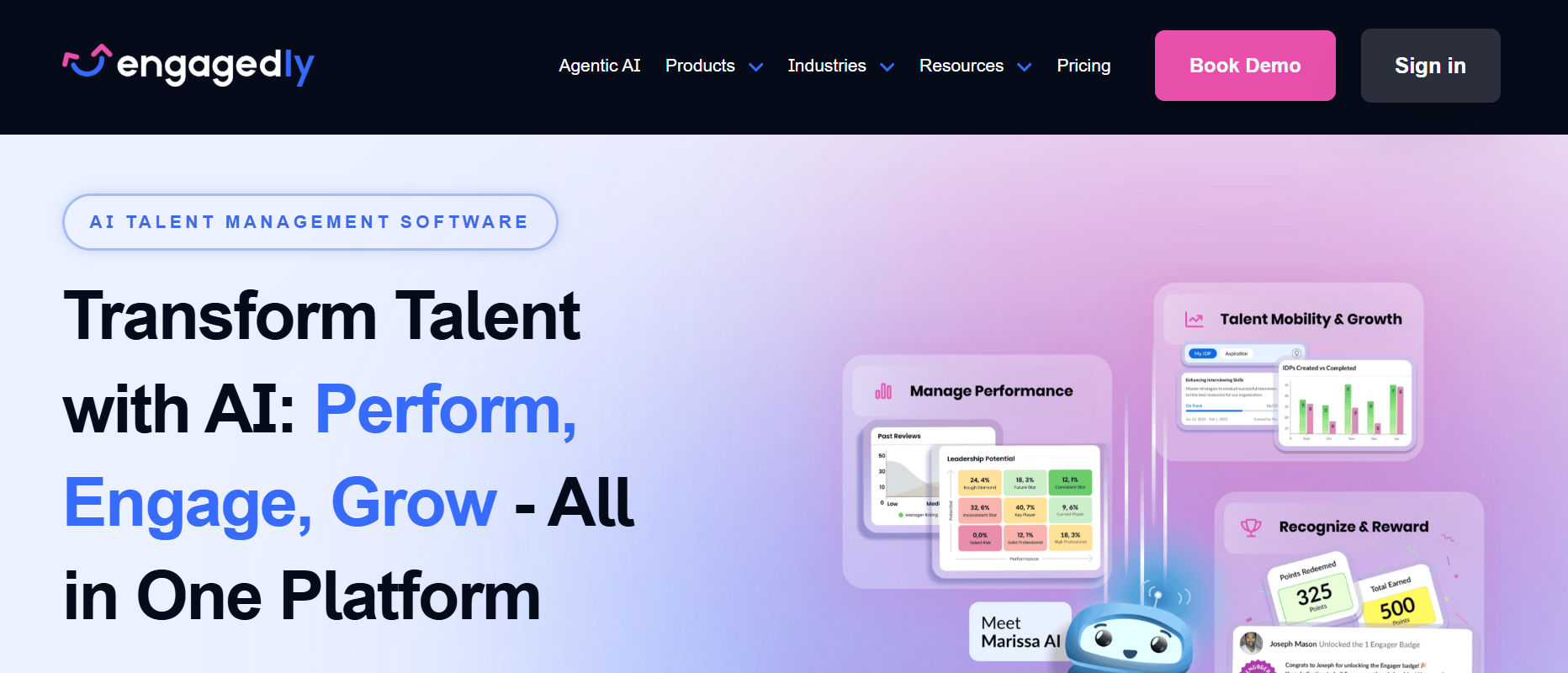
Engagedly is a comprehensive performance management tool that integrates performance reviews with employee engagement initiatives. It’s perfect for small businesses that want to combine goal tracking, feedback, and performance appraisals with employee engagement strategies.
- Strengths: Feedback tools, appraisals, 360-degree reviews, employee engagement surveys, and goal management.
- Best for: Small businesses aiming to enhance workplace culture through performance management and employee engagement.
Additional Features:
- Goal setting and alignment
- 360-degree feedback
- Continuous employee engagement features
- Learning and development integration
8. Zoho People
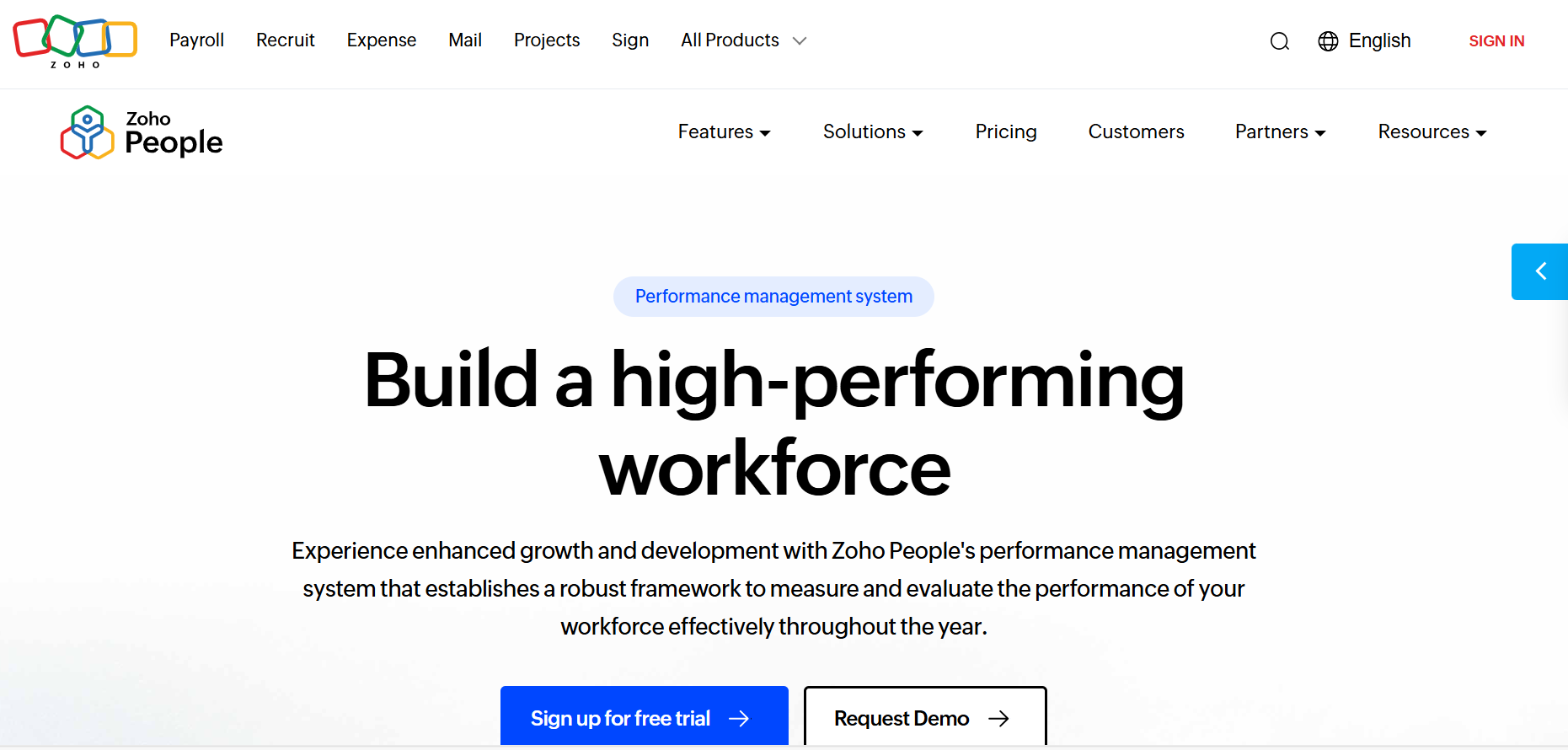
Zoho People is an affordable, scalable HR software solution offering strong performance management features. From performance appraisals to employee feedback, Zoho People is an excellent tool for small businesses looking for comprehensive HR management at a cost-effective price.
- Strengths: Budget-friendly, integrates with Zoho’s suite of products, customizable performance reviews, and feedback systems.
- Best for: Small businesses already using Zoho products and looking for a performance management tool that integrates easily with their existing setup.
Additional Features:
- Goal tracking and performance appraisal system
- Self-assessment and feedback features
- Time tracking and attendance management
- Integration with other Zoho apps like Zoho CRM and Zoho Payroll
9. Workday
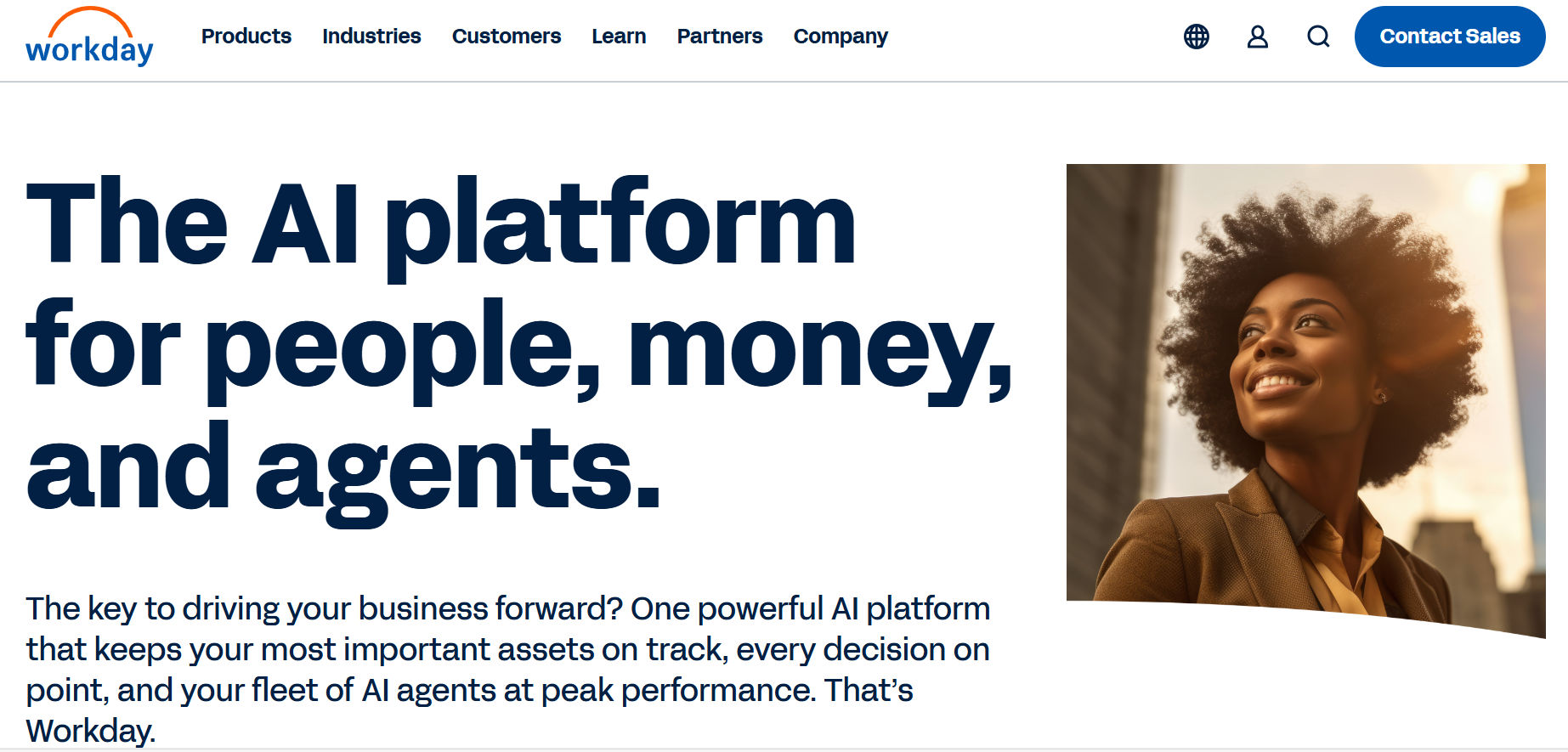
Workday offers an enterprise-level performance management system with features tailored for small businesses. It’s a comprehensive platform with powerful analytics, performance appraisals, goal management, and integration with other HR functions.
- Strengths: Advanced analytics, performance appraisals, goal setting, and a comprehensive HR solution.
- Best for: Businesses ready to scale and seeking an all-in-one HR and performance management solution.
Additional Features:
- Advanced performance analytics and reporting
- Goal alignment and progress tracking
- Real-time feedback and continuous development
- Learning and development tracking
10. Paycor
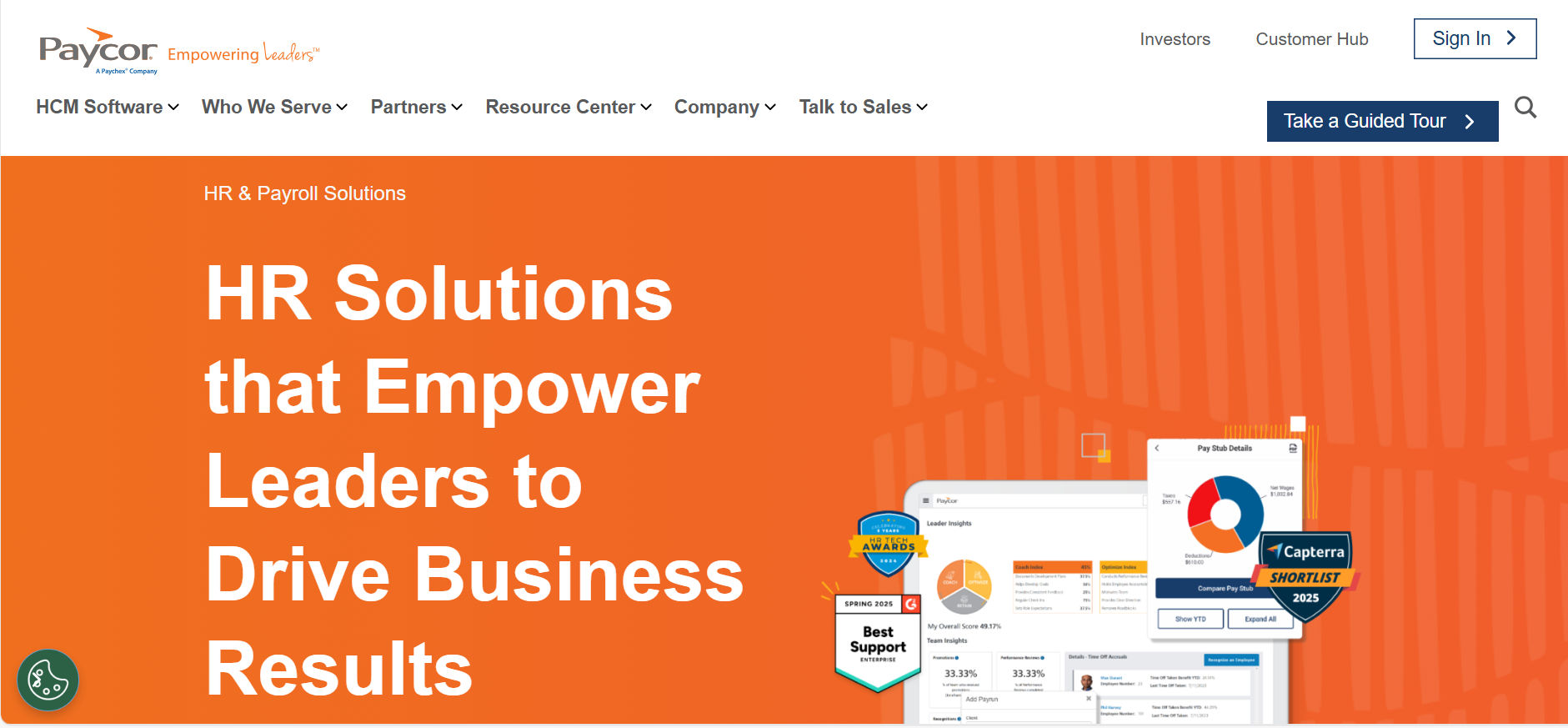
- Strengths: Payroll integration, performance reviews, employee development tracking, and goal-setting features.
- Best for: Small businesses seeking a unified platform that manages both HR and performance management functions.
- Performance appraisals and feedback
- Recruitment and hiring tools
- Payroll integration for streamlined processes
- Employee development tracking and learning modules
How Performance Management Drives Business Growth
Performance management is a powerful driver of business growth, especially for small businesses aiming to scale efficiently. It goes beyond tracking tasks; it’s about fostering a culture that encourages continuous improvement, alignment with business goals, and strategic decision-making. Here’s how Performance Management drives business growth:
1. Aligning Employee Efforts with Company Goals
Effective performance management ensures that employees’ individual goals are in line with the company’s objectives. This alignment creates a focused and motivated workforce. When employees understand how their work contributes to the business’s overall success, they are more likely to stay engaged and productive.
- Goal Alignment: Clear goals that are connected to broader company objectives boost motivation and ensure that everyone is working toward the same outcomes.
2. Enhancing Productivity
By setting measurable goals and providing regular feedback, performance management helps employees focus on high-priority tasks. It also eliminates inefficiencies by identifying areas where employees can improve.
- Optimized Efficiency: Real-time tracking helps businesses identify productivity gaps and implement solutions quickly, leading to improved efficiency and reduced operational costs.
3. Fostering Continuous Improvement
With regular performance reviews and feedback loops, employees have a clear understanding of what they’re doing well and where they can improve. This promotes a culture of continuous learning, allowing employees to grow and develop their skills, which benefits the business in the long term.
- Skill Development: Employees are more likely to seek improvement when they receive actionable feedback, directly impacting their contribution to business growth.
4. Boosting Employee Engagement and Motivation
When employees feel recognized for their contributions, they are more motivated to perform at their best. Performance management systems provide consistent recognition and feedback, which are key drivers of employee engagement. Engaged employees are more productive and contribute more to the company’s success.
- Recognition Drives Engagement: Regular feedback and goal tracking show employees that their work is valued, increasing job satisfaction and productivity.
5. Informing Data-Driven Decisions
Performance management systems offer valuable data that can guide key business decisions. From determining who deserves promotions to identifying skill gaps that need addressing, the insights gained from performance tracking ensure that decisions are based on solid data rather than assumptions.
- Data-Driven Insights: Performance data enables small businesses to make informed decisions on promotions, pay raises, and workforce adjustments, improving overall company strategy.
6. Improving Employee Retention
Employees who feel supported and developed are more likely to stay with a company. Performance management tools allow businesses to identify potential issues early, provide necessary development opportunities, and ensure employees remain engaged in their roles.
- Retention through Development: Continuous feedback and career development opportunities reduce turnover by fostering a supportive work environment.
7. Driving Innovation
Performance management doesn’t just focus on tracking tasks it encourages employees to think critically and innovate. With regular reviews and goal-setting, employees are motivated to bring new ideas that can improve products, services, or internal processes, contributing directly to business growth.
- Innovation Culture: Encouraging employees to take initiative and offering opportunities for growth sparks creativity and drives business advancement.
8. Supporting Scalability
As a business grows, performance management becomes even more crucial. The right system ensures that as new employees are added, they are aligned with the company’s vision and goals. This scalable approach ensures that performance management is effective at every stage of the business lifecycle.
- Scalability: Performance management systems provide the structure needed to handle growth while maintaining efficiency and productivity.
How to Choose the Right Performance Management Software for Your Small Business
Choosing the best Performance Management Software for Small Business involves considering several factors:
1. Understand Your Needs
Do you need simple goal tracking, or do you need a comprehensive performance management system with analytics, feedback, and reporting?
- Small businesses with limited HR resources should look for tools that are easy to set up and use.
- Companies looking to scale should opt for platforms that offer advanced features like analytics and long-term growth planning.
2. Consider Your Budget
Cost is always a factor when running a small business. Choose software that offers the best value for your needs and budget.
- Many tools offer free trials, so take advantage of them before making a decision.
- Look for scalable solutions that can grow with your business.
3. Evaluate User-Friendliness
The last thing you need is complicated software that your team finds hard to navigate.
- Choose software that offers an intuitive, easy-to-use interface.
- The less time your team spends learning the tool, the more time they have for meaningful work.
4. Integration with Existing Tools
Consider software that integrates well with your existing HR systems, payroll software, and other tools.
- Integration saves time and ensures a smooth workflow across departments.
5. Support and Training
Some software platforms offer comprehensive training, onboarding support, and dedicated customer service.
- Make sure you choose a platform with solid support if you need assistance setting up or troubleshooting.
Conclusion
Investing in Performance Management Software for Small Business can be a game-changer for your company. By selecting the right tool, you can improve employee engagement, increase productivity, and align your workforce with your business goals.
With so many great options available, it’s important to choose software that meets your specific needs. Start by evaluating your goals, budget, and the features that are most important to your business. Whether you’re looking for goal tracking, feedback tools, or performance reporting, the right software can transform the way your team operates.
Get started today with a free 14-day trial to see firsthand how performance management software can improve your business. If you need further assistance, book a demo to walk through the features and find the perfect solution for your team.
Join Our Creative Community
Frequently Asked Questions
How Do I Choose the Right Performance Management Software for Small Business?
Choosing the right performance management solution for your small business involves understanding your company’s specific needs. Look for software that offers features like goal setting, regular feedback, performance tracking, and reporting. It’s essential that the software integrates well with other tools you use and is scalable as your business grows. Consider factors like ease of use, customization options, and customer support when making your decision.
What is the Best Performance Management Software for Small Businesses?
The best performance management software for small businesses is one that balances functionality, affordability, and ease of use. Tools like BambooHR, 15Five, and Trakstar are highly recommended due to their user-friendly interfaces and comprehensive features such as goal tracking, real-time feedback, and performance reviews. It’s important to choose software that can grow with your business and meet evolving needs.
How Does Employee Performance Tracking Software Help Small Businesses?
Employee performance review software small business helps small businesses by providing insights into employee productivity, strengths, and areas for improvement. With features like goal setting, performance reviews, and continuous feedback, these tools help businesses optimize their workforce. It also streamlines administrative tasks, saving time and enabling managers to focus on fostering employee growth.
How Do I Measure Performance in a Small Business?
Measuring performance in a small business involves setting clear, measurable goals aligned with company objectives. Tools like performance management software allow you to track employee progress in real time, collect feedback, and provide performance reviews. Metrics such as productivity, goal achievement, and employee engagement can be monitored to assess overall performance and identify areas for improvement.
Can Performance Management Software Improve Employee Engagement?
Yes, performance management software can significantly improve employee engagement. By offering regular feedback, setting clear goals, and providing development opportunities, these tools create a culture of continuous improvement. Employees who receive consistent recognition and understand how their work contributes to the company’s success are more likely to stay engaged and motivated.
What key features should performance management software for small businesses include?
A high-quality performance management software for small businesses should include customizable goal setting, continuous feedback tools, user-friendly dashboards, and mobile access to make real-time progress tracking and performance conversations seamless
How does performance management software for small business improve employee productivity?
A performance management software for small business helps track goals, conduct regular reviews, and provide feedback, ensuring employees stay aligned with company objectives.
Is performance management software for small business affordable and easy to use?
Yes, performance management software for small business is designed to be cost-effective and user-friendly, making it simple for teams to manage performance without complexity.
Can performance management software for small business integrate with Microsoft 365?
Yes, performance management software for small business can easily integrate with Microsoft 365 tools like Teams and SharePoint for seamless collaboration.
What features should small businesses look for in performance management software?
Small businesses should look for goal tracking, performance reviews, feedback tools, and reporting features in performance management software for small business




_JiluXJRGNl.svg)























